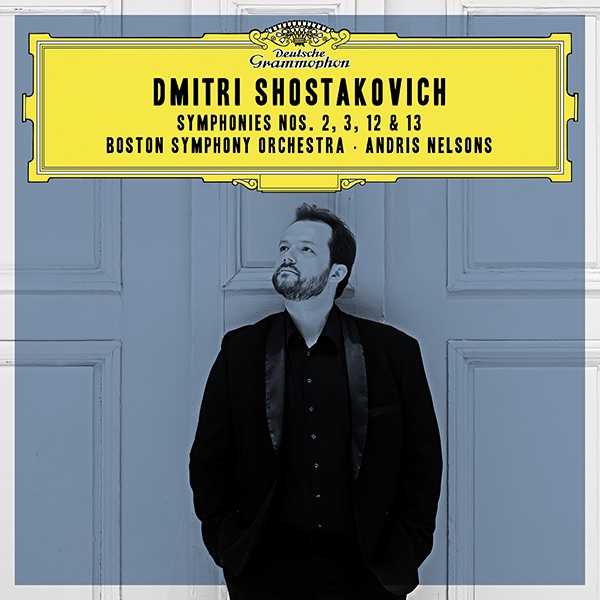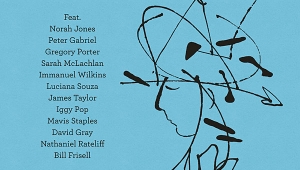| Columns Retired Columns & Blogs |
Recording of January 2024: Shostakovich: Symphonies Nos.2, 3, 12 & 13

Shostakovich: Symphonies Nos.2, 3, 12 & 13
Boston Symphony Orchestra, Andris Nelsons, cond.
Deutsche Grammophon 4864965 (3 CDs) (reviewed as 24/96). 2023. Shawn Murphy, Nick Squire, prods.; Murphy and Squire, engs.
Performance *****
Sonics *****
Boston Symphony Orchestra, Andris Nelsons, cond.
Deutsche Grammophon 4864965 (3 CDs) (reviewed as 24/96). 2023. Shawn Murphy, Nick Squire, prods.; Murphy and Squire, engs.
Performance *****
Sonics *****
Auditioned with the bloody conflicts in Ukraine and the Middle East as a backdrop, these riveting, superbly recorded performances confront listeners with the inescapable ravages of war. They also open a window on the shifting political convictions of one of the greatest composers to emerge during the early years of the Soviet Republic, Dmitri Dmitriyevich Shostakovich.
The premiere of Shostakovich's Symphony No.2 in B major, Op.14, "To October," took place toward the end of 1927, soon after his 21st birthday. A celebration of the 1917 Russian Revolution, it and the Third Symphony, whose premiere followed a little more than two years later, reflect Shostakovich's belief in Soviet-style Communism. The Second is wild, brash, experimental, and an embodiment of the ideology the composer then felt essential to music. It assaults us with one ravishing percussive barrage after another, punctuated by choruses and sections of strange beauty.
The Third Symphony, which celebrates May Day (the Workers' Day of International Solidarity), ends with a chorus proclaiming an overtly political message. It again shows Shostakovich trying out different musical ideas while attempting to conform to the state's demands that music speak to the proletariat. If it and its predecessor are not frequently performed, it is because they are the products of an irrepressibly inventive and increasingly rebellious composer who has yet to find the voice and language we associate with his Fifth symphony and later works.
The first attack on Shostakovich's music by the Russian Association of Proletarian Musicians took place in 1929, but it was only after Soviet dictator Joseph Stalin attended the opera in 1936 to hear Lady Macbeth of the Mtsensk District that attacks on the composer's music began to appear in the state-controlled newspaper, Pravda. From then on, Shostakovich lived in fear of persecution, imprisonment, and death, although there were periods of reprieve and even triumph. Another terrible period began in 1948, when the Supreme Soviet of the Russian Federation denounced the "formalistic," non-proletarian tendencies in Shostakovich's music and that of other composers.
In Symphony No.12 in D minor, Op.112, "The Year 1917," Shostakovich revisits the Russian Revolution. Composed in 1961, the year he turned 55, it is an attempt at "Soviet Realism" that perhaps reveals more about the composer's state of mind than he dared proclaim. As much as it celebrates Lenin and the events of 1917 that culminated in the Bolshevik Revolution, the 55-minute work is hardly the straightforward celebration of victory that the subtitles of its movements might suggest.
The biting irony of the Twelfth's final movement, The Dawn of Humanity, reveals the composer's faith-shaking awareness of the contradictions between theory and practice. Even if Shostakovich intended its tremendous finale as a celebration of the Soviet Utopia, he could barely restrain the sense of irony that produced some of the most macabre, grotesque, and circus-like music of the 20th century.
A year later came the long Symphony No.13 in B flat minor, Op.113, "Babi Yar." Shostakovich began composing the symphony as a response to the 1941 massacre of tens of thousands of Jews by Nazis in a ravine near the Ukrainian capital, Kiev, setting a poem by Soviet dissident poet Yevgeny Yevtushenko. The first movement became a broad condemnation of antisemitism including that endemic in the Soviet Union. Eventually Shostakovich set five poems by Yevtushenko over five movements addressing issues as disparate as attempts to shackle culture, the hardships of Soviet women and Soviet suppression broadly, and the evils of bureaucracy. Even in the midst of the Khrushchev thaw, a work like this from such a prominent artist attracted critical attention. Shortly after the premiere in December 1962, Premier Khruschchev demanded changes.
Here, with the tenors and basses of the Tanglewood Festival Chorus and New England Conservatory Symphonic Choir joined by the magnificent bass-baritone Matthias Goerne, Nelsons and the Boston Symphony Orchestra bring home the horrors of war. Goerne's profound conviction and vocal mastery are awe-inspiring, and this rendering of the symphony's condemnation is soul-shaking. The wonders of this music lie as much in its sheer force and endless inventiveness as in its alchemical journey from bloodshed to mystical sadness and stillness. A must!—Jason Victor Serinus
- Log in or register to post comments




































